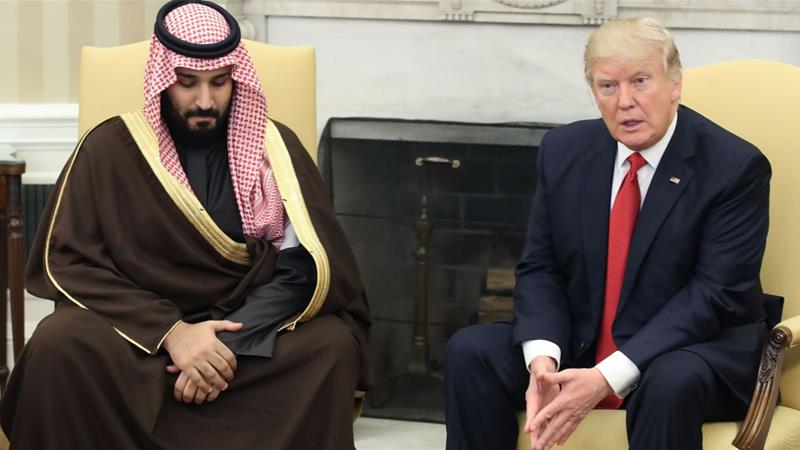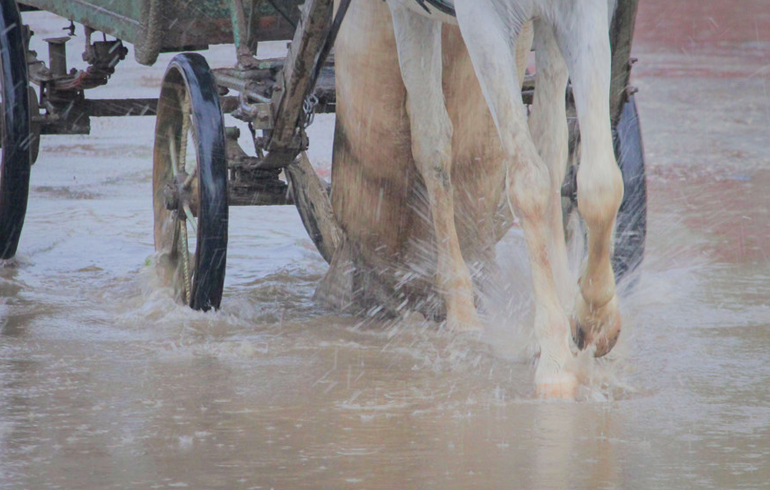An armada of tankers laden with an estimated 50 million barrels of Saudi Arabian crude is heading towards United States shores – cargo US shale oil producers regard as a foreign invasion delivered by a lower-cost competitor hell-bent on driving them out of business.
For President Donald Trump, the timing is particularly vexing. With US voters heading to the polls in November, Trump is under fire for his handling of the coronavirus pandemic, while the US economy – a cornerstone of his re-election campaign – is being annihilated by lockdowns.
Now an oil price crash rooted in COVID-19 disruptions and aggravated by Saudi shenanigans has many US oil firms staring down the barrel of bankruptcy. Last week, prices of US benchmark crude turned negative for the first time ever. Tens of thousands of energy jobs in Republican-controlled states are at risk of vanishing. US lawmakers who previously supported the status quo in US-Saudi relations are calling for a ban on crude imports from the kingdom.
More ominously for Saudi Arabia, the threat posed to the US shale patch has landed the 75-year-old alliance between Washington and Riyadh firmly in the electoral crosshairs, heaping pressure on Trump to make good on his signature campaign motto to put “America first”.
The latest inflection point
Despite diametrically opposed core values, the US-Saudi relationship has held together for three-quarters of a century on the strength of mutual security and business interests. But the marriage of convenience has been far from frictionless.
The 1973 oil embargo by the Saudi-led Organization of the Petroleum Exporting Countries (OPEC) helped push the US economy into recession. Images of American motorists queuing in petrol lines are still etched in the nation’s collective consciousness. The kingdom is also inextricably linked with the 9/11 attacks carried out by 19 hijackers, 15 of whom were Saudi nationals.
Over the past two decades, whenever oil prices become uncomfortable for US consumers and businesses, the No Oil Producing and Exporting Cartels Act (NOPEC) tends to rear its head on Capitol Hill. By taking aim at OPEC price fixing, the legislation, which has struggled through the years to find White House support, would strip Saudi Arabia of the sovereign immunity that shields it from a potential tsunami of lawsuits in the US.
The Saudis have also had their grievances with Washington. Riyadh famously bristled at the Obama administration’s efforts to defuse tensions with Iran, Saudi Arabia’s fiercest regional rival.
But the relationship between Riyadh and the White House warmed significantly when Trump took up residency at 1600 Pennsylvania Avenue.
To the kingdom’s delight, the Trump administration unilaterally withdrew from the Iran-nuclear deal in 2018 and went on to slap Tehran with relentless rounds of economic sanctions.
Trump has vigorously supported weapons sales to Riyadh despite its abysmal record on human rights, while his son-in-law Jared Kushner has forged a close relationship with the kingdom’s de facto ruler, Crown Prince Mohammed bin Salman (MBS).
But politicians in Congress have not been nearly as willing to ignore troubling behaviour by Riyadh.
MBS’s disastrous military campaign in Yemen and the profound humanitarian crisis it has spawned prompted efforts in Congress to block weapons sales to Riyadh. US politicians on both sides of the aisle were horrified by the murder of Saudi journalist and US resident Jamal Khashoggi – an assassination US intelligence concluded had been ordered by MBS.
But the existential threat to the US oil and gas sector – and the more than 150,000 Americans directly employed by it – has prompted a backlash against Saudi Arabia arguably not seen since the 1970s.
“The United States-Saudi Arabia relationship was in trouble before the coronavirus and oil double-crisis,” said Bruce Riedel, a senior fellow and director of the Brookings Intelligence Project.
“The Saudis are now losing support across the board politically. Trump and his son-in-law Jared are the only holdouts and that is not a good place to be when oil prices are so low,” Riedel told Al Jazeera.
Price routs and rhetoric
Oil prices started to retreat in January and February as COVID-19 marched across the globe, decimating demand. But they fell off a cliff in March after Saudi Arabia initiated an oil price war in retaliation for Russia’s refusal to back Riyadh’s calls for deep output cuts.
The resulting market carnage roiled US shale oil producers, especially firms that took on heavy debts to drill new wells when prices were higher.
With a strategically crucial industry on the ropes and tens of thousands of jobs on the line, Republicans in Congress – led by legislators from states whose fortunes depend heavily on a thriving domestic oil patch – amped up the rhetoric.
The Saudis were accused of engaging in “economic warfare”. On March 24, Senators Kevin Cramer of North Dakota and Dan Sullivan of Arkansas introduced the Strained Partnership Act calling for the removal of US troops and military equipment from Saudi Arabia unless it slashed output.
As Congressional pressure piled on, Trump personally appealed to MBS and Russian President Vladimir Putin to call a truce and stabilise oil markets.
During a phone call on April 2, Trump told MBS he could not stop US politicians from passing The Strained Partnership Act if OPEC did not curb production, Reuters News Agency reported on Thursday, citing sources familiar with the matter.
Trump’s diplomatic efforts culminated in an April 12 agreement by OPEC and its allies to scale back production by a record 9.7 million barrels per day (bpd).
But coronavirus has crushed demand by at least 30 million bpd. So while the historic production cut deal rendered the Strained Partnership Act moot, it failed to arrest, let alone reverse the oil price crash. Or calls for Trump to get tough with the Saudis.
“Trump thinks he delivered the deal of the century for everyone a few weeks ago – it doesn’t seem to be working out that way,” Tarik Yousef, senior fellow and director at Brookings Doha Center told Al Jazeera. “At some point, he will have to reinvent his own message.”
Indeed the price rout has since gotten worse as crude supplies continue to overwhelm demand.
Analysts estimate the storage hub in Cushing, Oklahoma – where US benchmark West Texas Intermediate (WTI) crude is delivered – will reach capacity sometime next month.
That prospect triggered yet another historic milestone in oil markets last week when the price of WTI for May delivery plunged to negative $40 a barrel as investors paid to have oil taken off their hands rather than get stuck with crude they have nowhere to stash.
That same day, Trump said he would look into a proposal by Senator Cramer of Oklahoma calling on the White House to block Saudi Arabian oil shipments to the US.
“We cannot allow Saudi Arabia to flood the market, especially given our storage capacity dwindling. Right now, the highest number of Saudi oil tankers in years is on its way to our shores,” Cramer said.
But some analysts say such calls will not fix the underlying problem, nor are they likely to find real traction with the White House.
“While a discussion about a Saudi flotilla of oil is a popular rhetorical device in practice it really doesn’t do much to reverse the oil dynamics,” Reed Blakemore, deputy director of the Atlantic Council Global Energy Center told Al Jazeera. “The President is aware of how much that would contradict the sentiment behind his negotiations with the Russians and Saudis. “
Rhetoric and reality
The trajectory of oil prices ultimately hinges on how quickly demand will rebound and how long it takes to draw down the glut.
“At some point, the consequence for Saudi Arabia and Saudi-US relations will crystallise, especially when the US shale and oil industry is really disseminated,” said Yousef. “The big question is how much of this is temporary and how much of it is permanent.”
Like the course of the coronavirus pandemic, the outlook for oil prices and US producers is cloaked in uncertainty. But there are possible lifelines Trump could throw to struggling US oil firms that do not involve punitive measures against Riyadh.
“The administration is exploring a range of options to try to provide a bit of a safety net to oil and gas companies, including SPR [Strategic Petroleum Reserve] buys to alleviate the storage crisis,” said Blakemore.
The Trump administration is also considering offering bridge loans to struggling US energy firms, possibly in exchange for a financial stake, Bloomberg News reported on Wednesday, citing sources familiar with the matter.
Given the unprecedented and innovative measures that have been deployed to shore up businesses against the ravages of the coronavirus, some analysts say legislation like NOPEC that could complicate US foreign policy objectives, is unlikely to come out of hibernation.
“While the US has a limited hand to save US Shale, it recognises that a bill like NOPEC will likely do more harm than good,” said Blakemore. “The president has remained committed to having a productive and pragmatic relationship with Saudi Arabia, which is an important element of this situation.”
But with an election less than seven months away and an economy that is already shrinking dramatically, that commitment could be sorely tested.
“My intuitive feeling is the president is hoping this will wash away soon but I don’t think it’s going to,” said Yousef. “The impact even with recovery and some of the demand coming back will not come on time for him. He will do what he does best: start pointing his finger and blaming others for whatever damage has been done.”
Source: Al Jazeera News




















































